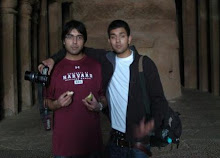So, I was reading about Hegel's The Phenomenology of Spirit just now, and it made me realize how non-falsifiable and circular some theoretical abstraction can be.
Dialectical phenomenology, from my interpretation, locates human experience at the center of understanding. Trying to grapple with important questions like how we assign value to different aspects of our existence, how we know the things we know, what, prima facie, constitutes objective knowledge, etc., force us to think about the very foundation of our being. For Hegel, phenomenology provides a foundational thought process from which these questions become increasingly accessible. Through the process of experience (experiencing phenomena), we are constituted as rational actors who produce, for ourselves, understanding through our various interactions and activities.
The flipside to this way of thinking becomes more clear through an investigation of Marxism. While it might be true that it is the process of experience which informs our understanding of our subject positions, that experience is not manifested neutrally. On the contrary, Marxists would probably posit that it is capitalism, an inherent relationship between the working class and those who control the modes of production, which is the superstructure which determines what we get to experience. So, to use one of Zizek's critiques of capital as a contemporary example, commodity fetishism seems to demonstrate how the hierarchical relationship implicit to late democratic capitalism by definition implies that our experience (in the Hegelian sense) is conditioned by capitalism. Maybe more clearly, growing up in a capitalist society, the phenomena of our experience are capitalist--naturally, therefore, the way in which we conceive of things is pre-determined by how those things were presented to us. If we lived in a society where money was both taboo and carried a stigma, our experience would lead us to believe that capitalism, as a value system, was wrong.
So, I thought about this stuff for a little bit and I was pretty convinced. After all, it makes sense that our understanding of how we exist is informed by experience; if not, how can we ever know? I saw this one quote on wikipedia that I thought encapsulated this way of thinking pretty well: "the real is rational, and the rational is real."
Then, I started thinking about epistemology, the study of knowledge. Obviously, pure epistemological philosophy is in serious disagreement with dialectical phenomenology. For epistemolog-ists, the point is that we cannot embark on a project of considering existence until we have investigated beforehand how that knowledge is produced. In fact, this seems to cut phenomenology at the knees--unless we know how what we experience is produced or why it is produced, how can that experience inform our being (it becomes, by definition, an uninformed decision!)
So, I tried to take a step back and see things from the big picture--straight up epistemology vs. phenomenology, and this is what left me feeling vacuous:
For phenomenology, our understanding of the real comes from how we experience the real.
For epistemology, we cannot know how or what we experience in the real unless we decipher beforehand what the real is.
Counter-point 1: For phenomenology, there is no way to know (epistemology, know = knowledge) the real, without having experienced it.
Counter-point 2: For epistemology, that experience means nothing unless we know what we are going to experience beforehand.
Counter-point 3: For phenomenology, there is no beforehand, there is only what we experience when we experience it.
Counter-point 4: For epistemology, how do you know what you are experiencing?
And so on and so forth ad infinitum...Do you see why I find that circular and non-falsifiable?! How can you ever know which comes first? Is it possible to know? Can we reduce human history or historical events in a way that can ever resolve these distinction?!
Probably not...but, if one of the many purposes of human life is to determine what is purposeful, than resolving this struggle seems tremendously important! How do we determine purpose unless we have some way of knowing how to decide what is purposeful?
This makes me think two things:
1) Maybe it is impossible for us to ever extricate ourselves from these self-fulfilling phenomena.
2) Maybe that's the point. Maybe we just pick one side of the debate based on what we feel, even if that feeling isn't neutral. If we already and eternally exist within a specific subject position, then self-determination of value might be the only way to ever make life purposeful from your own perspective.
To me, this sounds a lot like Zizek's parallax view. Once we have explored various symbolic interpretations of the real, the parallax view liberates us from the incompleteness of symbolic interpretation--the ability to see things from different perspectives (eg ethics, ontology, etc.), and to then decide what you believe and go with that, at least makes sense on an individual level.
What do you think?
Sunday, April 20, 2008
Subscribe to:
Post Comments (Atom)

No comments:
Post a Comment